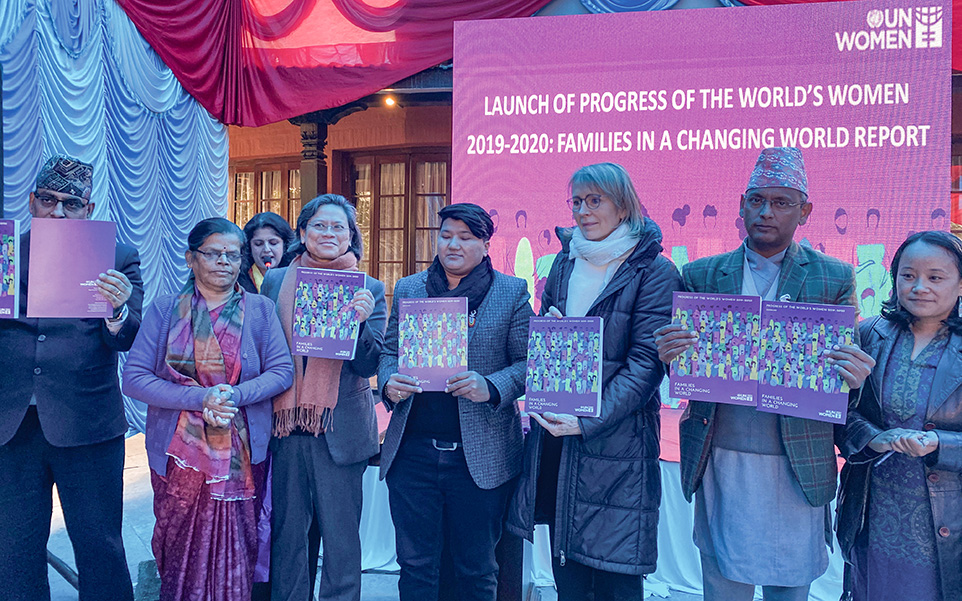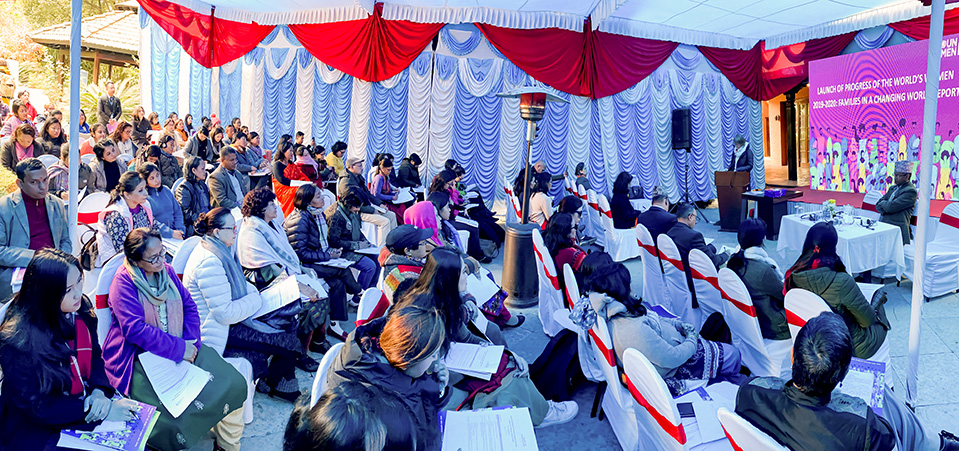Nepal shows solid progress in legislating for the rights of women and girls, UN Report says, but cultural barriers persist
Nepal has reached several milestones in safeguarding the rights of women and girls, but they continue to face challenges in particular within the home, according to a recent report by the United Nations, launched this month in Nepal.Date:
Author: Naresh Newar

Kathmandu, Nepal — Nepal is an example of a low-income country that has made significant progress in improving women’s access to sexual and reproductive healthcare, including access to safe and legal abortion. It is one of the few countries in the world that has gone from banning abortion outright to allowing it on request in recent times. Nepal is also one of the only three countries including Bhutan and Uzbekistan in Central and Southern Asia to criminalize marital rape, according to UN Women report titled Progress of the World’s Women 2019 – 2020: Families in a changing world.
However, the same report stresses that Nepal’s girls and women continue to face challenges inside their own homes, deprived of financial freedom, bargaining power, enduring long working hours, and lack decision making powers. The mothers-in-law often play gatekeeping roles in younger women’s access to health services as well as in their disempowerment, ranging from choosing their clothes to making decisions over childbearing or children’s marriages, said the report.
The global report does not cover individual countries in depth, but rather serves as a guiding policy document with key recommendations for the governments to work on comprehensive family-friendly policy agenda to bring equality and justice into homes. Through the report, UN Women wanted to promote the idea of recognizing the diversity of families in Nepal, and to work together to implement the proposed policy agenda to advance women’s rights and ensure that all families can flourish.
“In Nepal, the recommendations from the report are all applicable for introducing family-friendly policies, by respecting voice and choice of women and girls, and these policies can be done without putting much financial burden on the country,” said UN Women Nepal’s national advisor Sharu Joshi Shrestha.
The global report, launched worldwide in June, received a national-level launch on 13 December 2019 by UN Women Nepal. Its shares findings and advocates among UN Women’s diverse partners including the government, civil society organizations, academicians, UN agencies and development partners, with a view to integrating those findings into the partners’ development programming through the lens of families.

Partner representatives attending the launch highlighted the need to end Nepal’s traditional social norms and harmful practices, which have been the root causes of injustice and discrimination for women and girls within the families.
Nepal still has a range of challenges such as gender gaps within the families over control of resources, polygamy, son preference, child marriage, the traditional practice of chhaupadi (a practice that restricts women from participating in daily activities during menstruation), unequal gender division of labour, dowry, and mobility restrictions to women and girls.
There is still stigma attached to LGBTI (Lesbian, gay, bisexual, transgender and intersex) individuals, resulting in discrimination and exclusion even within their own households.
“Sadly, most of the LGBTI people have been forced to leave their homes,” said Laxmi Ghalan from Mitini Nepal, an organization promoting the LGBTI rights. “All of us and regardless of our different gender identities, we should be feeling safe within our own families.”
One of the report’s key recommendations is investing in gender-sensitive data on families and households. In Nepal, like many countries, the lack of data constrains the ability of policy makers to base family-friendly policies on contemporary family and household structures.
“We have to strengthen empirical evidence to help introduce new policies,” said Kailash Rai, an academic researcher. “There is lack of actual statistics on the key categories that could be source of dialogue from the national to the family levels.” She added that the country has yet to create a mechanism or make proper planning for data collection.
The focus of the report is a recognition of the vital importance of families in creating equality and justice for women and girls. At global scale, despite the progress in eliminating gender discrimination, the family laws have been the slowest to change. These laws govern matters like women’s rights to choose who and when to marry, provide the possibility of divorce if needed, and shape women’s access to family resources.
“There are challenges in our society and our top priority should be on transforming our families into places of equality and justice” said Chandra Kumar Ghimire, Secretary of the Ministry of Women, Children and Senior Citizens. “It is all in our mindset that shapes our behaviour, actions and reactions. This mindset stays with our families even within ourselves and this governs our attitude.”
He added that the report certainly provides a valuable reference document to reshape our policy and actions, so that gender equality and women’s empowerment will not be a distant dream for Nepal.
The Government of Nepal has several plans within its National Plan of Action on Gender Equality and Women Empowerment with a vision to create a gender equal nation with specific targets for equal and meaningful participation of women for substantial equality, reducing gender-based violence, empowerment and increasing access to resources.
“We have both opportunities and challenges on how to materialize these plans by taking them to all our 761 governments” at federal, provincial and local municipality levels, said Kiran Rupakheti, Joint Secretary, National Planning Commission. “So, we need concerted efforts from the civil society groups and communities to take our activities to all the households.”